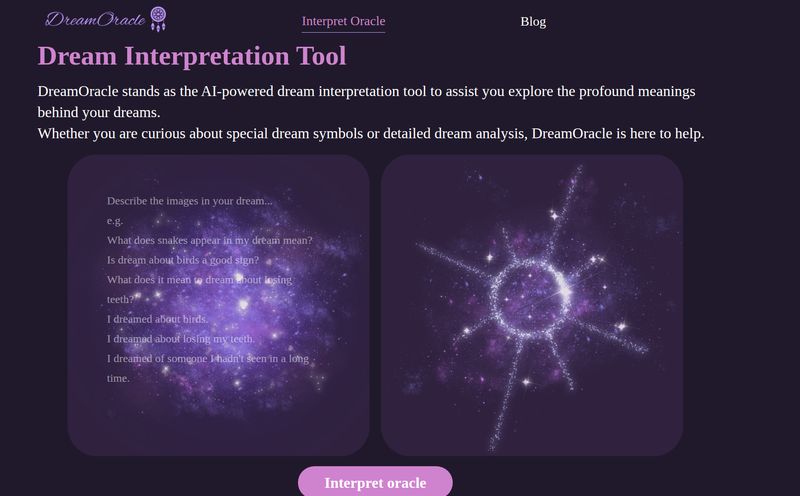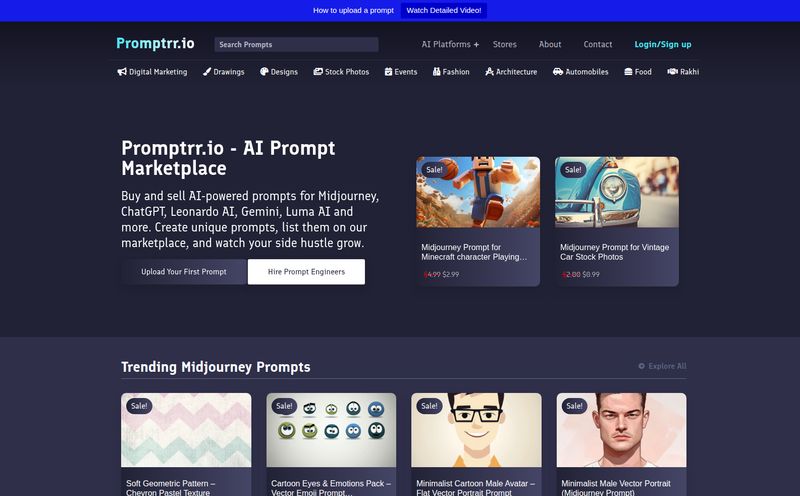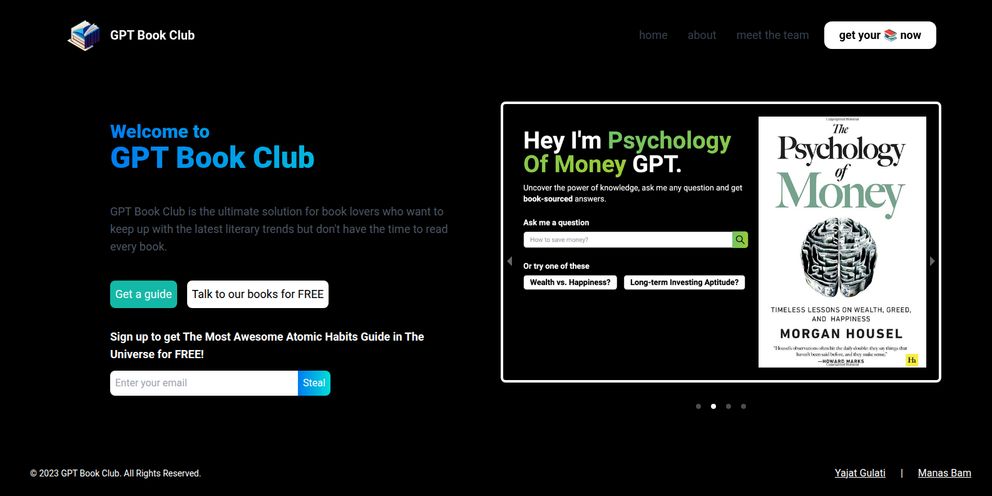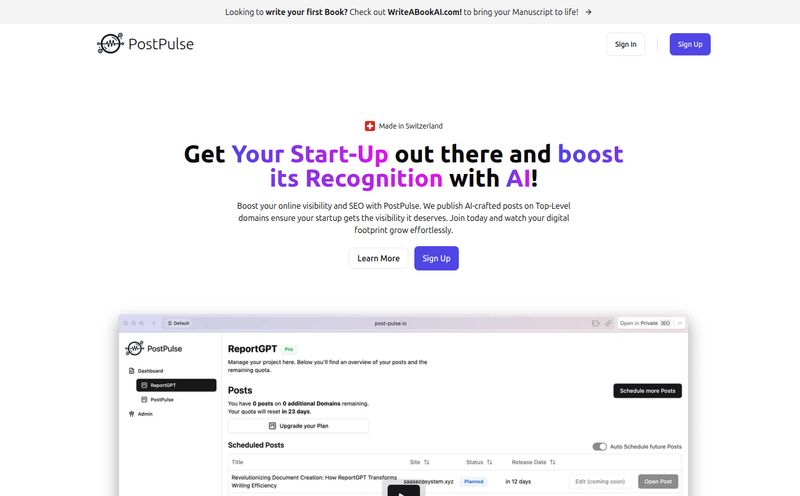The modern job hunt is a special kind of nightmare. You spend hours scrolling through job boards, your eyes glazing over, until every single "fast-paced environment" and "rockstar team player" listing blends into a grey, soul-crushing mush. And then comes the real work: tailoring your resume, and worst of all, writing that dreaded cover letter.
Honestly, who has the time? For every job you're genuinely excited about, there are ten others you're applying to just to keep the momentum going. And writing a unique, compelling cover letter for each one feels like a full-time job in itself. I’ve been in the digital marketing and SEO space for years, and even I get that familiar pit in my stomach when faced with a blank document titled 'Cover_Letter_Final_v3_real_final.docx'.
So, when the wave of AI tools started cresting, I was cautiously optimistic. Could this be the life raft we've all been waiting for? I've seen a dozen tools pop up, all promising to revolutionize the process. Recently, a new name, JobStream, caught my eye. It claims to use GPT-4 to make you "stand out on every application." Big words. So, I decided to take it for a spin and see if it lives up to the hype.
So What Exactly Is JobStream?
At its core, JobStream is an AI-powered assistant designed to take the grunt work out of applying for jobs. Think of it as a smart sidekick. You provide it with your professional history—your past roles, your skills, your big wins—and it uses that information to automatically generate cover letters and answer those tricky, open-ended questions on application forms.
The part that got my attention is that it specifically mentions using GPT-4. For those not deep in the tech weeds, that's a pretty powerful engine. It's a signal that they're not messing around with a clunky, first-generation language model. The whole idea is to move beyond generic, copy-paste templates and create something that actually sounds like it came from a human who, you know, read the job description.
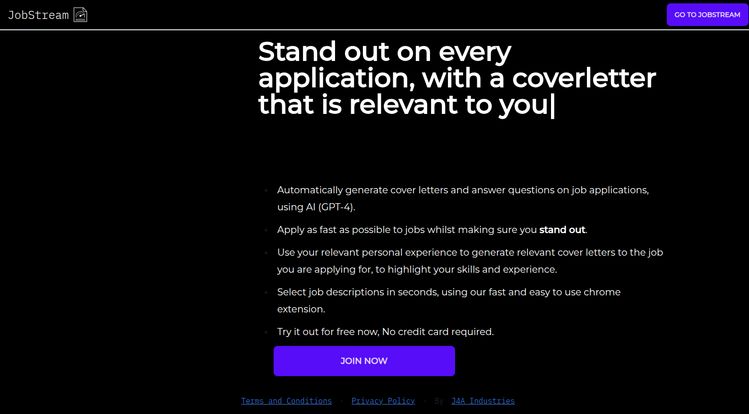
Visit JobStream
How It Aims to Change the Application Grind
The promise is simple: apply to jobs faster, but with better, more relevant materials. I found the approach pretty clever, focusing on a few key pain points in the job application process.
The Chrome Extension is a Smart Touch
First off, there's a Chrome extension. This might sound like a small thing, but in terms of workflow, it's a big deal. Instead of having to copy and paste the entire job description from LinkedIn or Indeed into another window, you just click a button. The extension grabs the details for you. It’s a quality-of-life feature that shows the developers understand the actual, tedious steps of the process. It removes a layer of friction right at the start, which I appreciate.
AI Cover Letters That Don't Scream 'Robot'
This is the main event. JobStream's big selling point is its ability to generate a coverletter based on your experience, tailored to the job you're applying for. This is where you feed the machine. You give it the bullet points of your career, and it weaves them into a narrative that aligns with the job description you've selected. For instance, if the job calls for experience in traffic generation and CPC campaigns, the AI will pull your relevant achievements and highlight them. The goal is to get you a solid 80-90% of the way there, a really strong first draft that you can then polish.
Tackling Those Awkward Application Questions
You know the ones. "Describe a time you faced a challenge." "What makes you a good fit for our company culture?" These can be tougher than the cover letter. JobStream also automates answers to these, again using your provided experience as its source material. This is a massive timesaver, turning a 45-minute application into a 10-minute one. For anyone playing the numbers game in their job search, that's incredibly valuable.
A Healthy Dose of Skepticism: The Reality of AI in Job Hunting
Okay, it all sounds great. Almost too great. As someone who analyzes content for a living, I know that AI isn't magic. It has its limits. So, let's talk about the other side of the coin.
The 'Garbage In, Garbage Out' Rule
The quality of JobStream's output is directly tied to the quality of your input. If you give it lazy, one-line descriptions of your past jobs, it’s going to produce a lazy, generic cover letter. It can't invent your accomplishments. You still have to do the initial work of documenting your experience thoughtfully. Think of it less as a magic wand and more as an amplifier. It amplifies what you give it. So, take the time to feed it with strong, quantifiable achievements.
Can AI Truly Capture Your Unique Voice?
This is the big question for me. A truly great application has personality. It has a voice. While GPT-4 is impressive, it can sometimes produce text that feels a little... sterile. A little too perfect. My advice? Never, ever just copy and paste without reading and editing. Use the AI-generated text as your foundation. Then, go in and tweak it. Add a sentence that is uniquely you. Change a phrase to something you'd actually say. Let the AI handle the structure and the boring parts, then you come in and add the soul. It's a co-pilot, not the pilot.
Your Professional Data and Privacy
To use a tool like this, you have to hand over a lot of personal and professional data. That's just the reality of it. While JobStream has a privacy policy listed on their site, it's always smart to be mindful of what you're sharing. This isn't a criticism unique to JobStream, but a general point for anyone using AI productivity tools. Be aware of the trade-off: convenience in exchange for data. For most people hunting for a job, it's a trade they're willing to make, but it's something to keep in mind.
So, What's the Price for This Magic?
Here’s the best part, at least for now. JobStream is currently free to try, and they don't even ask for a credit card to get started. This is a huge green flag for me. It shows confidence in their product—they're letting you see the value for yourself before asking for a dime.
Of course, this probably won't last forever. I'd speculate they'll eventually move to a freemium model (e.g., 5 free applications per month) or a relatively low-cost monthly subscription. Honestly, considering the hours this thing can save you, I think a subscription model around $10-$20 a month would be a no-brainer for anyone actively job searching. Think about it: what's one hour of your time worth?
Who Is This Tool Really Built For?
I don't think this tool is for everyone, but for a few specific groups, it could be a game-changer.
- The Volume Applicant: If you're in a competitive field like tech, marketing, or sales, you need to send out a lot of applications. JobStream could be your best friend, drastically cutting down the time spent on each one.
- The Career Changer: Trying to break into a new industry? This tool can help you identify and frame your transferable skills in a way that makes sense to recruiters in that new field.
- The 'I Hate Writing' Professional: You could be the best at what you do, but terrible at writing about it. If you freeze up when you see a blank page, this tool gives you the momentum to get started.
Who isn't it for? Maybe someone applying for a highly creative or academic role, where a deeply personal and handcrafted application is not just expected but required. But for the vast majority of corporate and tech jobs, this fits the bill.
My Final Verdict on JobStream
After playing around with it, I'm genuinely impressed. JobStream isn't a silver bullet that will magically land you a job. No tool can do that. What it is, is an incredibly effective tool for overcoming the two biggest hurdles in the job hunt: inertia and time.
It gets you past the blank page and produces a high-quality draft that’s 80% of the way there. That remaining 20% is where you come in to add your personal touch and verify the details. If you use it smartly, as an assistant rather than a replacement for your own effort, JobStream could drastically reduce your job hunting timeline and, more importantly, save you from burnout. Given that you can try it for free, I'd say it's an absolute must-try for anyone currently navigating the job market.
Frequently Asked Questions
- What is JobStream?
- JobStream is an AI-powered platform that helps you apply for jobs faster. It uses your professional experience and the job description to automatically generate custom cover letters and answers to application questions.
- How does JobStream personalize cover letters?
- It's not just a template filler. You provide the tool with details about your skills and work history. Its AI (GPT-4) then analyzes the specific job you're applying for and selects the most relevant parts of your experience to highlight in the cover letter.
- Is JobStream free to use?
- As of right now, yes. You can sign up and use it for free without providing any payment information. It's likely they will introduce paid plans in the future, but for now, it's free to try.
- Will my application sound like a robot wrote it?
- It can, if you just copy and paste without review. The AI is very good, but the best approach is to use the generated text as a strong first draft. Always read it over and make small edits to infuse your own voice and personality.
- Is it safe to put my professional experience into JobStream?
- Like any online service, there's a trade-off between convenience and data privacy. JobStream requires your professional data to function. It's advisable to review their Privacy Policy on their website to ensure you're comfortable with how your data is handled.
- What makes this different from just using ChatGPT?
- The main difference is the streamlined workflow. JobStream integrates everything with a Chrome extension to grab job descriptions, stores your professional profile, and is specifically trained and designed for the job application process. It saves you from the hassle of crafting complex prompts and copy-pasting between multiple tabs.
